Image Copyright by Didier Martin, source - FreeBibleImages.org 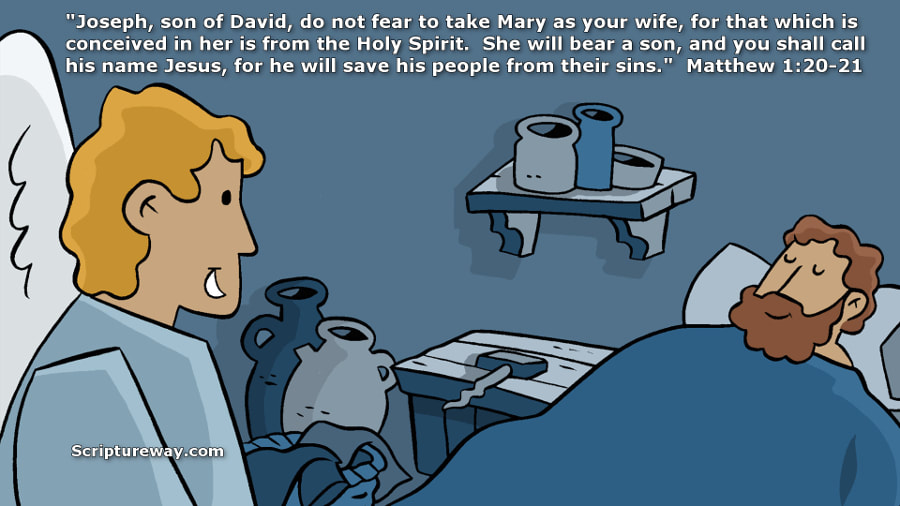 An Angel of the Lord Appeared to Joseph in a Dream - Matthew 1:20-21 - Used under license An Angel of the Lord Appeared to Joseph in a Dream - Matthew 1:20-21 - Used under license
"She will bear a son, and you shall call his name Jesus, for he will save his people from their sins." (Matthew 1:21)
This lesson explains the meaning of the name "Jesus" that an angel of the Lord instructed Joseph to give to our Savior at his birth.
Consider. How does the name "Jesus" explain what his mission was to be?
The Bible verse quotations in this lesson are taken from the English Standard Version (ESV) unless noted otherwise (Ref. 1).
What does "Jesus" mean?
The Greek word for the name, "Jesus," is Iésous (pronounced ee-ay-sooce'), and means Yahweh saves or Yahweh is salvation (Ref. 2). Yahweh is the vocalization of the four consonants of God's name, YHWH, in the Old Testament (Exodus 3:14 NASB, Ref. 3).
"Jesus" is the Greek form of the Hebrew name, "Joshua." The Hebrew word for "Joshua" is Yehoshua (pronounced yeh-ho-shoo'-ah), and means the Lord is salvation (Ref. 4). "Joshua" was a common name in the Old Testament, especially the name of Moses' successor (Joshua 1:1-2). What does "Christ" mean?
Jesus is distinguished from others by his title, "the Christ" (Matthew 1:16). The Greek word for "Christ" is Christos (pronounced khris-tos'), and means the Messiah, the Anointed One (Ref. 5).
Who was the father of Jesus?
The scriptures are clear that God is the father of Jesus the Christ. The angel Gabriel told Mary before she conceived Jesus, "The Holy Spirit will come upon you, and the power of the Most High will overshadow you; therefore the child to be born will be called holy—the Son of God" (Luke 1:35). An angel of the Lord later told Joseph who was betrothed to Mary, "Joseph, son of David, do not fear to take Mary as your wife, for that which is conceived in her is from the Holy Spirit" (Matthew 1:20). That is why in Matthew 1:21, the angel told Joseph, "She will bear a son," and not, "She will bear you a son." Compare Matthew 1:21 with Genesis 17:19 and Luke 1:13.
Why did Jesus come to earth?To save his people from their sins
Matthew 1:21 tells us why Jesus came to earth -- to "save his people from their sins." The name "Jesus" fits perfectly with Jesus' mission because Jesus' name means "Yahweh [or, God] is salvation." To "save" means to rescue or deliver from danger and bring into divine safety (HELPS Word-studies - Ref. 6, Ref. 7, 1 Timothy 1:15). Jesus came to rescue believers -- we who believe in and have faith in Jesus -- from the penalty and power of sin (Ref. 6, Romans 5:8-9). The opportunity to become saved is available to all persons who will believe in Jesus regardless of their background as Jew or Gentile (Acts 4:12, Acts 8:36-37 NKJV, Acts 16:30-31).
Apply. Be a person who believes in Jesus Christ who came to earth to save you from your sins. Put your faith, trust, and confidence in the Lord Jesus, and you will be saved (Acts 16:31). Confess your sins to him today, and he will forgive your sins and will give you the gift of eternal life (1 John 1:9, Romans 6:23).
Related Lessons
"Why Did Jesus Come?" -- John 3:17 "What Does 'To Be Saved' Mean in the New Testament?" -- Acts 16:31
References
1. https://www.biblegateway.com/versions/English-Standard-Version-ESV-Bible/ 2. https://biblehub.com/greek/2424.htm 3. https://www.biblegateway.com/resources/encyclopedia-of-the-bible/Yahweh 4. https://biblehub.com/hebrew/3091.htm 5. https://biblehub.com/greek/5547.htm 6. https://biblehub.com/greek/4982.htm 7. https://www.scriptureway.com/home/why-did-jesus-come
1 Comment
"And I, if I am lifted up from the earth, will draw all people to Myself." (John 12:32 NASB)
"And I, if I be lifted up from the earth, will draw all men unto me." (John 12:32 KJV)
This lesson explains what Jesus meant when he said, "And I, if I am lifted up from the earth, will draw all people to Myself" (John 12:32).
Consider. What are you doing in response to Jesus' drawing of you? How are you responding to Jesus' influence in your life?
The scripture references in this lesson are taken from the New American Standard Bible (NASB) unless noted otherwise (Ref. 1).
And I
The "I" here at the beginning of John 12:32 is strongly emphatic (Ref. 2). In John 12:32 Jesus points to himself versus his opposition -- the "ruler of this world" who will be cast out (John 12:31, Matthew 4:8-10). Jesus will assert his rule over the world, and Jesus will draw all (people) to himself (Ref. 2).
If I am lifted up from the earth
Jesus knew with certainty and accurately predicted that his death would be by crucifixion (John 12:32-33, John 3:14-15, Numbers 21:6-9 ESV). Jesus knew that men would crucify him and elevate him above the earth (John 19:17-18). The Greek word for "lift up" in John 3:14 and John 12:32 has two meanings, first to elevate, and second to exalt (Ref. 3).
The people who crucified Jesus thought they were ending his life. However, they didn't realize that God would exalt Jesus through his death, his resurrection, and his ascension to heavenly glory at the right hand of the throne of God (Matthew 28:1-7, Acts 1:8-11, Philippians 2:5-11, Ephesians 1:17-23, Hebrews 12:2). Will draw all (people) to Myself
Jesus said in John 12:32 "And I, if I am lifted up from the earth, will draw all to Myself" (Ref. 4 - Berean Literal Bible). (The NASB and KJV translations add the word "people" or "men" after the word "all"). The Greek word for "draw" [helkó, pronounced hel-koo'-o] means to induce influence, or attract by inward power (Ref. 5). The Greek word for "all" [pas] in John 12:32 means the whole, every kind of (Ref. 6).
Beginning at Pentecost (after Jesus' ascension) and continuing to this day, the drawing of people to Christ is accomplished by the work of the Holy Spirit (Acts 1:8, Acts 2:14-21, Ref. 2). The Holy Spirit's work of drawing people to Christ is for all people -- regardless of ethnicity, national identity, gender, geographic location, or economic or social means. The Holy Spirit does not exclude you from being drawn to Christ because of "who you are." The drawing influence of the Holy Spirit for all people to come to Jesus may be accepted or rejected. Mankind has free will. Some people will reject the influence of the Holy Spirit and the spiritual attraction power of Jesus Christ. Others, praise God, will yield to the drawing influence of the Holy Spirit and will receive Jesus Christ as their Lord and Savior. In Jesus Christ, believers will find acceptance, forgiveness, salvation, love, spiritual empowerment, and the gift of eternal life. How are you responding to the drawing power and influence of Jesus Christ?
Apply. Respond with joy to the drawing power and influence of Jesus Christ, who was lifted up, and died for you. Receive him unto yourself. He will welcome you, forgive your sins, guide you, and will give you eternal life. (Luke 15:20-24, 1 John 1:9, John 16:13, John 3:14-16, Romans 6:23).
References
1. https://www.biblegateway.com/passage/?search=John+12%3A32&version=NASB 2. https://biblehub.com/commentaries/ellicott/john/12.htm Ellicott's Commentary for English Readers - John 12:32 3. https://biblehub.com/greek/5312.htm 4. https://biblehub.com/john/12-32.htm 5. https://biblehub.com/greek/1670.htm 6. https://biblehub.com/greek/3956.htm
"I will ask the Father, and He will give you another Helper, so that He may be with you forever ..." (John 14:16)
"But the Helper, the Holy Spirit, whom the Father will send in my name, he will teach you all things and bring to your remembrance all that I have said to you." (John 14:26)
This lesson explains 1) Who is the Helper?, 2) Why did Jesus ask the Father to send his disciples another Helper?, and 3) How does the Helper -- the Holy Spirit -- aid us as believers in Christ today?
The scripture references in this lesson are taken from the English Standard Version (ESV) and the New American Standard Bible (NASB) (Ref. 1, Ref. 2).
Consider. How have you experienced the Holy Spirit helping you in your life? How would you like the Holy Spirit to help you in your life going forward?
On the night before his crucifixion and death, Jesus spoke with his remaining disciples to prepare them for his departure (John 13:33, 14:1-2). Judas Iscariot had already left to betray Jesus and was not the beneficiary of these promises (John13:26-30). Jesus told his disciples, "I will ask the Father, and He will give you another Helper, so that He may be with you forever ..." (John 14:16).
Who is the Helper?
In John 14:16, the Greek word for "Helper" is paraklétos (pronounced par-ak'-lay-tos), and means one who is called to the aid of another (Ref. 3, Ref. 4). Paraklétos signifies "an advocate in a court of law, but more widely a helper in any form whatsoever" (Ref. 4). The ESV, NIV, and KJV translate paraklétos as "Helper," "Advocate," and "Comforter" respectively. Jesus identifies the Helper as the Holy Spirit (John 14:26). Jesus also describes the Helper as the "Spirit of truth" in John 14:17, 15:26, and 16:13.
Why did Jesus ask the Father to send his disciples another Helper?
Jesus was about to leave his disciples through his suffering and death on a cross (John 19:1-3, 19:15-19). After his resurrection, Jesus would go to the Father (John 14:2, 16:28; 20:17, Acts 1:8-9). Jesus' disciples would need another Helper -- someone to be the strong continuer of Jesus' presence, to be their permanent companion (Ref.4). The Helper would teach them all things and would guide them into all the truth (John 14:26, 16:13).
The Helper would "be with" and "be in" (after Pentecost) Jesus' disciples permanently. Whereas Jesus during his earthly ministry was with them for three years, the Helper -- the Holy Spirit -- would be with them (and is with us as Jesus' disciples) to the end of time (John 14:16-17, Ref.4). Jesus' disciples also need to be strengthened and power-filled by the Holy Spirit to accomplish the mission Jesus sends us to in an unfriendly world (Mark 13:9-11, Mark 16:15-16, Acts 1:8). What is the role of the Holy Spirit in our lives as believers in Christ?How does the Holy Spirit help us?
The following scriptures describe the many ways the Holy Spirit helps us as people who believe in and trust in Jesus Christ as our Lord and Savior.
The Holy Spirit is with us and dwells in us permanently. John 14:16-17 The Holy Spirit strengthens us and is our spiritual companion forever. The Holy Spirit teaches us all things and calls to our remembrance all that Jesus has said to us. John 14:26 The Holy Spirit especially is our teacher for helping us to understand God's word. The Holy Spirit bears witness to us about Jesus and helps us bear witness about Jesus to others. John 15:26-27 The Spirit of truth guides us into all the truth. John 16:13 The Greek word for truth in the New Testament is alétheia, pronounced phonetically as "al-ay'-thi-a." In ancient Greek culture, alétheia was synonymous for "reality" as the opposite of illusion, i.e., fact (Ref. 5). Jesus not only taught the truth but also is the truth (John 14:6). The Holy Spirit gives us power to be Jesus' witnesses wherever God sends us at home or abroad in the world. Acts 1:8, 1 Thessalonians 1:5 The Holy Spirit gives us the words to speak when we face trials, persecution, and suffering for our faith in Christ. Mark 13:9-11 The Holy Spirit guides us in what to do (Acts 10:19-20) and where to go (Acts 16:6-10). The Holy Spirit helps us to put to death the deeds of the flesh. Romans 8:13-14 The Holy Spirit helps us to know that we are the adopted children of our heavenly Father. Romans 8:16, Galatians 4:6, Ephesians 1:3-5 The Holy Spirit intercedes for us and helps us to pray. Romans 8:26 The Holy Spirit gives us spiritual gifts for the purpose of serving others and building up the body of Christ. 1 Corinthians 12:1-11, Romans 12:6-8, Ephesians 4:4-12 The Holy Spirit's work in us helps us to bear spiritual fruit that benefits ourselves as well as others. Galatians 5:22-23 The Holy Spirit strengthens us with power in our inner being whether we are men, women, or children. Ephesians 3:14-16 The Holy Spirit fills us with rivers of living water so we can be a spiritual blessing that refreshes and comforts others. John 7:38-39 The presence, companionship, and strengthening of the indwelling Holy Spirit is Jesus' gift to all who put their faith and trust in him. Thanks be to God for such a precious gift!
Apply. If you are not yet a believer in Jesus Christ, confess your sins to him, yield control of your life fully to him, and he will fill you with the Holy Spirit. If you are a believer in Jesus Christ, thank God each day for the presence of the Holy Spirit with you and for helping you to understand and apply God's word to your life. Thank God for the Holy Spirit guiding you in making godly decisions and for strengthening you through the challenges -- and for some of you, persecution -- you are going through. Thank God for the Holy Spirit helping you to discern, to prepare for, and to do boldly the life work that God reveals to you to do in Jesus' name.
Related Lessons
"The Spirit of Truth" - John 16:13 "Jesus is the Truth" - John 14:6 "Adoption as Sons" - Ephesians 1:4-5 "Characteristics of a Child of God - Part 1" - Matthew 7:16 "What is Living Water in the Bible?" - John 4:10
References
1. https://www.biblegateway.com/passage/?search=John+14%3A16&version=ESV 2. https://www.biblegateway.com/passage/?search=John+14%3A16&version=NASB 3. https://biblehub.com/greek/3875.htm 4. https://biblehub.com/commentaries/maclaren/john/14.htm MacLaren Expositions of Holy Scripture - John 14:16-17 5. https://biblehub.com/greek/225.htm
"Let us therefore come boldly to the throne of grace, that we may obtain mercy and find grace to help in time of need." (Hebrews 4:16 NKJV)
Consider. In what area of your life do you need God's mercy and grace to help you with temptation, weakness, or a "storm" that you are going through?
The scripture references below are from the New King James Version (NKJV) unless noted otherwise (Ref. 1).
1. Come boldly to the throne of gracea. Come boldly
In the first part of Hebrews 4:16, the author of states, "Let us therefore come boldly to the throne of grace." "Come" means draw near or approach (Ref. 2). "Boldly" means with confidence (Ref. 3). The "therefore" at the beginning of the verse points to two reasons why we can draw near with confidence to God:
(1). Jesus, as our high priest, has opened the way for us to God's presence in heaven (Hebrews 4:14, 9:24, 10:19 NLT). Recall that when Jesus died, the veil of the temple separating people from God was torn in two (Mark 15:37-38). (2). Jesus, more so than any other, understands our weaknesses and temptations. Jesus, was in all points tempted as we are, yet without sin (Hebrews 4:15). Because Jesus Christ has paid with his life the atonement for our sins once and for all time, we can come to God boldly, with confidence (Hebrews 9:11-12 NASB). We come not trusting in our ourselves but in the merits of our Lord and Savior, Jesus Christ. b. To the throne of grace
Let us rejoice that there "is" a throne of grace and not of "justice" only (Ref. 4). The Greek word for "throne" literally means a (king's) seat, and metaphorically refers to God in heaven (Ref. 5). "Grace" is God's favor towards us. God freely gives us his grace because God is inclined to bless us (Ref. 6).
Because Jesus now is at the right hand of God's throne, the throne of God has become the throne of grace (Hebrews 8:1, 12:2). From generation to generation, from every land, and in every language, God may be approached. In all times of our weaknesses and temptation, we may be assured that he is on that throne (Ref. 4). At any time, 24/7, we may approach God with confidence to receive mercy and find grace to help us in our time of need. 2. Receive mercy and find grace to help in time of needa. Mercy
At God's throne of grace, we receive mercy (Hebrews 4:16 ESV). Mercy is God's compassion towards us in our sin-full and hurt-full condition (Ref. 7). In the same way that Jesus had compassion on and touched and healed the leper and forgave the paralytic, God reaches out in mercy and compassion and touches us where we hurt and need healing and forgiveness (Mark 1:40-42, 2:1-5). By God's mercy he offers us salvation in Christ (Titus 3:4-5 ESV). By God's love and mercy, even when we were dead in our trespasses, God "made us alive together with Christ" (Ephesians 2:4-5).
b. Grace
At God's throne of grace, we find grace. Grace is God's favor towards us (Ref. 6). Grace is a blessing and a free gift. Grace is totally undeserved. By God's grace, Jesus forgave the men who nailed him to the cross (Luke 23:33-34). By God's grace, the Apostle Paul found the sufficiency of God's power to help him in his weakness (2 Corinthians 12:7-9). By God's grace, even though we are saved already through faith in Christ, God helps us when we are going through a tough time such as a loss, temptation, persecution, or poor health. By God's grace, God has given us the gifts of salvation and eternal life (Ephesians 2:8-9, Romans 6:23).
c. Help
At God's throne of grace, we receive mercy and find grace to help us in time of need (Hebrews 4:16). The Greek word translated as "help" [boétheia] in this verse occurs only twice in the New Testament -- in Hebrews 4:16 and Acts 27:17 (KJV) -- and has a nautical meaning (Ref. 8).
Recall that in Acts 27:14-17 the Apostle Paul was traveling to Rome on a ship that was caught in a severe storm. The sailors were losing control of the ship and feared running aground. In Acts 27:17 (read in KJV) the sailors wrapped supporting ropes or cables called "helps" [boétheia] around the wooden hull of their ship from stem to stern to hold the planks of the ship tightly together during the storm (Ref. 8, Ref.9). In the same way the ancient mariners used "helps" to wrap around, undergird, and support their vessels in storms, God provides his help to support us and hold us together when we are going through the storms of life. d. Timeliness
God's mercy and grace always are available to help us at the time we need (Ref. 10). This is encouraging news indeed. When we have trials and temptations, we can come boldly to God's throne to receive mercy and find grace to help us at any time. As author Dillon Burroughs has correctly concluded, "God is never late and rarely early. He is always exactly right on time -- His time" (Ref. 11).
Listen
Listen, watch, and sing along in your heart with this video of Alan Jackson singing, "What a Friend We Have in Jesus." Note the words, "Jesus knows our every weakness; take it to the Lord in prayer!" (Ref. 12).
Prayer. Dear Jesus, thank you that by your sacrifice for us, we can boldly approach you. Thank you for understanding our trials and temptations. We need your mercy and grace. In your graciousness, forgive our sins and fill us with your presence. Strengthen us, support us, and surround us with your grace so we with your help will be victorious over sin and will come safely through the storms we are experiencing. We give you all the praise, glory, and honor. In your precious name we pray. Amen.
Related Lessons
"The Meaning of God’s Favor" -- Psalm 30:5 "Made Alive Together with Christ - A New Quality of Life" -- Ephesians 2:4-5
References
1. https://www.biblegateway.com/passage/?search=Hebrews+4%3A16&version=NKJV 2. https://biblehub.com/greek/4334.htm 3. https://biblehub.com/greek/3954.htm 4. https://biblehub.com/commentaries/barnes/hebrews/4.htm Barnes Notes on the Bible - Commentary on Hebrews 4:16 5. https://biblehub.com/greek/2362.htm 6. https://biblehub.com/greek/5485.htm 7. https://biblehub.com/greek/1656.htm 8. https://biblehub.com/greek/996.htm 9. https://biblehub.com/commentaries/ellicott/acts/27.htm Ellicott's Commentary for English Readers - Acts 27:17 10. https://biblehub.com/greek/2121.htm 11. https://www.goodreads.com/quotes/789710-god-is-never-late-and-rarely-early-he-is-always 12. https://hymnary.org/text/what_a_friend_we_have_in_jesus_all_our_s
Image source: Sweet Publishing / FreeBibleImages.org
"Truly, truly, I say to you, whoever believes in me will also do the works that I do; and greater works than these will he do, because I am going to the Father." (John 14:12)
Consider. What did Jesus mean when he said that believers in him would do greater works than he had done?
The Bible verse quotations below are from the English Standard Version (ESV) unless noted otherwise (Ref. 1).
Believers shall do the works of Jesus
The works that Jesus did while he was on earth -- such as healing the sick and raising the dead -- confirmed the authority of his teaching and demonstrated that the Father was in him and he in the Father (John 14:10-11, Ref. 2). Jesus' promise that we will do his works is directed to believers -- people who trust in, adhere to, and rely upon Jesus (Ref. 3). The works that we do in the name of Jesus as believers demonstrate the authority of the words of Jesus, point to him as our Savior, and show that he is in us and that we are in him (Matthew 28:18, 1 John 4:14, Colossians 1:27, Romans 8:1).
With Jesus’ exaltation to the right hand of the God completed, he now gives us -- believers, the body of Christ -- the Holy Spirit to help us accomplish his works on earth (John 14:16-17, John 16:13, Acts 1:8, Acts 2:32-33, Acts 2:37-38, Ephesians 1:18-23). The Holy Spirit apportions distinctly different gifts to individual believers as he wills (1 Corinthians 12:11, 1 Corinthians 12:28-31, Romans 12:6-8). Not all of us are gifted to work miracles, but are given other gifts (1 Corinthians 12:28-31). That is why we as different members of the body of Christ need to work together as the body of Christ to accomplish the works of Christ. Jesus Said Believers Shall Do Greater Works Than These
When Jesus said that believers would do "greater works than these," he was referring to the greatly increased world-wide reach and extent of his works that would be accomplished by his disciples. When Jesus ministered during his time on earth, he did his works in the geographic area where he traveled -- principally in Galilee and Judea (Ref. 4, Ref. 5). Jesus has since commanded his disciples -- "Go therefore and make disciples of all nations" (Matthew 28:19), "Go into all the world and proclaim the gospel to the whole creation" (Mark 16:15). In Acts 1:8, Jesus promised his disciples (that includes us who believe in him), "You will receive power when the Holy Spirit has come upon you, and you will be my witnesses in Jerusalem and in all Judea and Samaria, and to the end of the earth."
When considering what Jesus meant by "greater works than these," think also about the miraculous change done by God that occurs in the heart of each man, woman, and child when they repent of their sins and believe in the Lord Jesus Christ. When Peter preached his Holy Spirit-inspired sermon on Pentecost, the result was that about 3,000 souls repented of their sins and believed in the Lord Jesus (Acts 2:22-24, Acts 2:36-41). When Peter visited Joppa and raised Dorcas from the dead, the result was that "many believed in the Lord" (Acts 9:36-42). When the Lord provided an earthquake at the Philippian jail which opened the doors for Paul and Silas and the other prisoners, the result was that the Philippian jailer believed in (put his faith in and trust in) Jesus Christ, and rejoiced (Acts 16:25-34, Ref. 3). When Philip witnessed to the Ethiopian eunuch about Jesus, the result was that the Ethiopian eunuch became a believer in Jesus Christ, the Son of God. Philip baptized him, and the Ethiopian eunuch went on his way rejoicing (Acts 8:26-39 NASB1995). Consider also that doing "greater works than these" world-wide includes acts of service such as giving others a drink of clean water in Jesus' name (Mark 9:41), teaching others to become disciples (Matthew 28:19-20), and providing for the needs of the "least of these" (Matthew 25:31-40).
Apply. Repent of your sins, and believe in the Lord Jesus Christ. You will receive forgiveness of your sins and the gift of the Holy Spirit (1 John 1:9, Acts 2:38). By the power of the Holy Spirit, use the gifts that the Holy Spirit has given you to do the works of Jesus. May your actions towards others confirm the truth of Jesus' words, point people to him as their Savior (Luke 19:10), and show them the love that God has for them (John 3:16).
Related Lessons
"When Jesus Said, 'Truly, Truly,' What Did he Mean?" -- John 6:47 "The Authority of Jesus" -- Matthew 28:18
References
1. https://www.biblegateway.com/passage/?search=John+14%3A12&version=ESV 2. https://www.scriptureway.com/home/the-authority-of-jesus 3. https://biblehub.com/greek/4100.htm 4. https://en.wikipedia.org/wiki/New_Testament_places_associated_with_Jesus 5. https://www.ccel.org/bible/phillips/CN160-TRAVELS.htm
Images by FreeBibleImages.org - used under license
Read Luke 10:38-42 (RSV): "Now as they went on their way, he entered a village; and a woman named Martha received him into her house. (39) And she had a sister called Mary, who sat at the Lord’s feet and listened to his teaching. (40) But Martha was distracted with much serving; and she went to him and said, 'Lord, do you not care that my sister has left me to serve alone? Tell her then to help me.' (41) But the Lord answered her, 'Martha, Martha, you are anxious and troubled about many things; (42) one thing is needful. Mary has chosen the good portion, which shall not be taken away from her.'"
Consider. Are you like Mary, listening to Jesus' word and receiving his guidance? Are you like Martha, gifted in serving others, but becoming overly busy and anxious? What is the one thing needful?
1. Martha welcomed Jesus as a guest into her home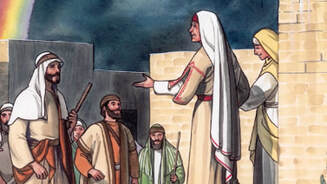 Martha Welcomes Jesus as a Guest Into Her Home Martha Welcomes Jesus as a Guest Into Her Home
Luke 10:38 tells us that when Jesus and his disciples were traveling to Jerusalem, Martha welcomed him as a guest into her home. Martha was the "mistress of the house," the head of the household (Ref. 1, Ref. 2). The Greek word translated as "welcomed" or "received" in Luke 10:38 means that Martha was personally responsible for seeing to Jesus' needs while he was under her roof (HELPS word-studies - Ref. 3).
2. Mary chose to sit at Jesus feet and was listening to him
Mary, too, was eager to give Jesus a fitting reception. Luke 10:39-40 and 42 tell us that she left Martha in making preparations and instead chose [decided, made a deliberate choice] to sit at Jesus' feet and listen to his word (Ref. 4). In the ancient world, sitting at a teacher's feet -- literally and figuratively -- was the posture of disciples or learners (2 Kings 4:38, Luke 8:35, Acts 22:3, Ref. 5). By her action, Mary showed that she was willing to receive Jesus' word and give up herself to the guidance of Christ -- the one thing needful (Ref. 6).
3. Martha was distracted with much serving
Luke 10:40 tells us that Martha was "distracted with much serving." Note that "serving" [Greek word diakonia - ministry - Ref. 7] is one of the "gifts of grace" that the Apostle Paul mentions in Romans 12:6-8. Martha was gifted at serving others (John 12:1-2). However, in Luke 10:40-41 Martha became so "distracted" [literally drawn away] by the many tasks she was doing that she was drawn away from listening to Jesus and his word (Ref. 8).
4. Jesus tenderly reproved Martha for being anxious about many things
Martha asked Jesus to reprove Mary for leaving Martha to do the serving alone (Luke 10:40). Instead, Jesus instead tenderly reproved Martha, saying, "Martha, Martha, you are anxious and troubled about many things" (Luke 10:41). Jesus did not reprove Martha for her hospitality or her gift of serving. However, Jesus did gently reprove Martha for being anxious [worried, divided, figuratively "going to pieces"] and troubled [disturbed, agitated] about many things (Ref. 9, Ref. 10).
5. Jesus commended Mary for choosing the one thing needful
Jesus commended Mary for choosing the good portion, the one thing needful. Mary chose to give undivided devotion to Jesus -- to listen to his word and to give herself to his guidance (Ref. 6).
Apply. Make time each day for the one thing needful -- Give undivided devotional time to Jesus. Listen to Jesus' word. Pray. Receive Jesus' guidance and follow his priorities for the things you will do to serve others each day.
References
1. https://biblehub.com/commentaries/barnes/luke/10.htm Barnes' notes on Luke 10:38 2. https://www.merriam-webster.com/dictionary/mistress 3. https://biblehub.com/greek/5264.htm 4. https://biblehub.com/greek/1586.htm 5. https://biblehub.com/commentaries/barnes/luke/10.htm Barnes notes on Luke 10:39 6. https://biblehub.com/commentaries/mhc/luke/10.htm Matthew Henry's Commentary on Luke 10:38-42 7. https://biblehub.com/greek/1248.htm 8. https://biblehub.com/greek/4049.htm 9. https://biblehub.com/greek/3309.htm 10. https://biblehub.com/greek/2350.htm
(6) "Therefore humble yourselves under the mighty hand of God, that He may exalt you at the proper time, (7) casting all your anxiety on Him, because He cares for you." (1 Peter 5:6-7 NASB)
Consider. God willingly desires for us to cast all our anxiety on him. Have you cast all your anxiety -- all your worry and care -- on God?
Introduction
The Apostle Peter is writing to Jewish and Gentile Christians in Asia Minor (1 Peter 1:1-3). Peter recognizes that they are suffering for being Christians (1 Peter 4:12-19), and he advises them, "If you suffer as a Christian, do not be ashamed, but praise God that you bear that name" (1 Peter 4:16). Peter exhorts the elders in the churches to be witnesses of Christ's sufferings and to be shepherds of God's flock (1 Peter 5:1-2). He encourages young people to be subject to their elders, and he instructs all of them (and us today) to clothe themselves (ourselves) with humility because, "God opposes the proud but gives grace to the humble" (1 Peter 5:5).
Casting our anxiety on God and humility go together
Sometimes when we are anxious and are looking for an encouraging verse in the Bible such as 1 Peter 5:7, we might miss the point that humility and casting our anxiety on God go together. Peter begins verse 6 with "Humble yourselves under the mighty hand of God" (1 Peter 5:6). Then, in verse 7 he adds "casting all your anxiety on him" (1 Peter 5:7). The Greek word for "humble" in 1 Peter 5:6 is tapeinoó (pronounced tap-i-no'-o) and means to make low (Ref. 1) or being willing to take a low place (Ref. 2). When we humble ourselves before God, we recognize that we are not reliant on ourselves only but are dependent on God. God is the one who fills us, who lifts us up, and who cares for our every need (Ref. 3, Acts 1:8, Ephesians 5:18, James 4:10, Philippians 4:19, 1 Peter 5:7).
Casting is like throwing
The Greek word for "casting" in 1 Peter 5:7 is epiriptó (pronounced ep-ir-hrip'-to) and means to throw (Ref. 4). This word in Greek occurs only twice in the New Testament (Englishman's Concordance - Ref. 4). Before Jesus' triumphant entry into Jerusalem, Luke tells us, "They brought it (the colt) to Jesus, and they threw [cast] their coats on the colt and put Jesus on it" (Luke 19:35, parentheses and brackets added). In the same way the disciples throwing their coats on the colt was a one-way trip for the coats, casting our anxiety on Jesus should be a one-way trip for our anxiety.
We are to cast all of our anxiety -- not just parts of it -- on the Lord
In 1 Peter 5:7 the Greek word for "anxiety" is merimna (pronounced mer'-im-nah) which means cares and worries -- anything that fractures and divides a person's (our) being into parts (HELPS Word-studies - Ref. 5). In 1 Peter 5:7, merimna [anxiety] is singular and unites all of our cares and worries into one whole (Ref. 5, Ref. 6). Jesus' explanation of the parable of the sower in Matthew uses the same singular form of merimna. "And the one on whom seed was sown among the thorns, this is the one who hears the word, and the worry [anxiety] of the world and the deceitfulness of wealth choke the word, and it becomes unfruitful (Matthew 13:22, brackets added). The fact that our anxiety -- the whole of it -- chokes the fruitfulness of God's word in us is a good reason for us to accept God's invitation to cast all our anxiety on him.
Because he cares for us
Peter gives the reason why we are to cast all our anxiety on the Lord -- because he cares for us (1 Peter 5:7). The Greek verb translated as "cares" in this second part of 1 Peter 5:7 is meló (pronounced mel'-o) and means pays attention to, is concerned about, gives thought to (Ref. 7). The God who cares for the sparrows cares for us as well (Matthew 6:26, Matthew 10:29-31). David wrote, "But I am poor and needy; yet the Lord thinketh upon me" (Psalm 40:17 KJV). The God who loves us so much that he gave his Son to die for us invites us and welcomes us to cast all our anxiety on him (John 3:16, Romans 5:6-8, Psalm 55:22, 1 Peter 5:7).
Apply. The main way we cast our anxiety on God is to pray to, thank, and trust God. Pray to God and tell him your needs. Thank him for his answers (Philippians 4:6-7). (Have a continual "attitude of gratitude.") Trust God that he will take care of your concern according to his will and timing (1 John 5:14). Tell others how God has answered your prayers (Psalm 66:16). Your testimony describing how God has helped you will encourage others. Pray, thank, trust, and tell.
Related Lessons:
"Psalm 37:5 Meaning - Commit Your Way to the Lord" "The Peace of Believing Prayer (Philippians 4:6-7)" "Blessed Be the Lord Who Daily Bears Our Burden" -- Psalm 68:19 "Jesus' Invitation - Come to Me and Rest" -- Matthew 11:28
References:
1. https://biblehub.com/greek/5013.htm 2. https://biblehub.com/commentaries/barnes/1_peter/5.htm Barnes' Notes on the Bible - 1 Peter 5:6 3. https://biblehub.com/greek/5312.htm 4. https://biblehub.com/greek/1977.htm 5. https://biblehub.com/greek/3308.htm 6. https://biblehub.com/commentaries/meyer/1_peter/5.htm Meyer's NT Commentary on 1 Peter 5:7 7. https://biblehub.com/greek/3199.htm |
Daily Bible Verse(Click the link above) AuthorMr. Whitney V. Myers. Christian. For more information, please visit the Author Page. Posting ScheduleI plan to provide new postings about once a month. Planned Topics(subject to change) Recent Posts(most recent three months) Popular Posts(top 10) Categories
All
Archives
July 2024
|
|
Copyright 2018-2024 Whitney V. Myers |
Listed in Feedspot's Top 100 Bible Study Blogs and Websites |
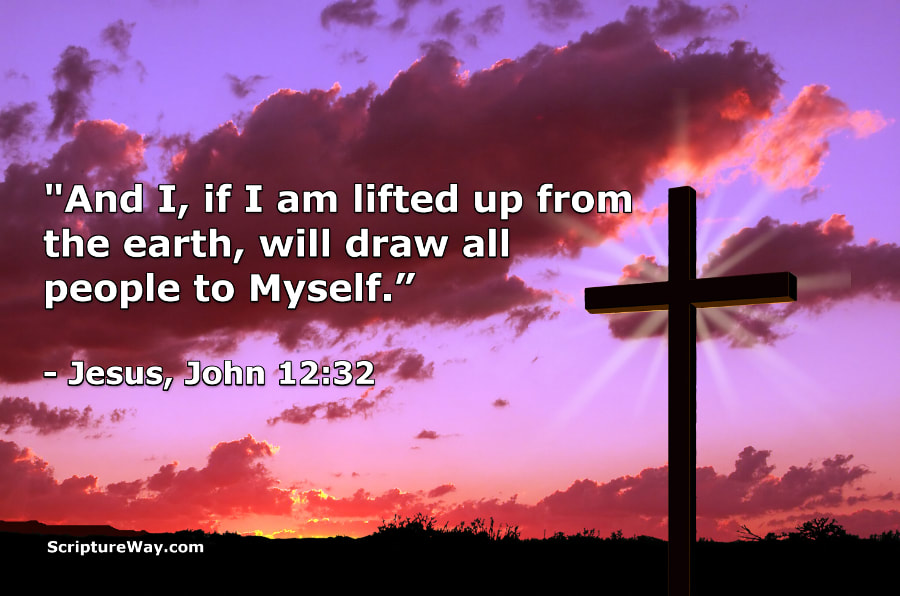


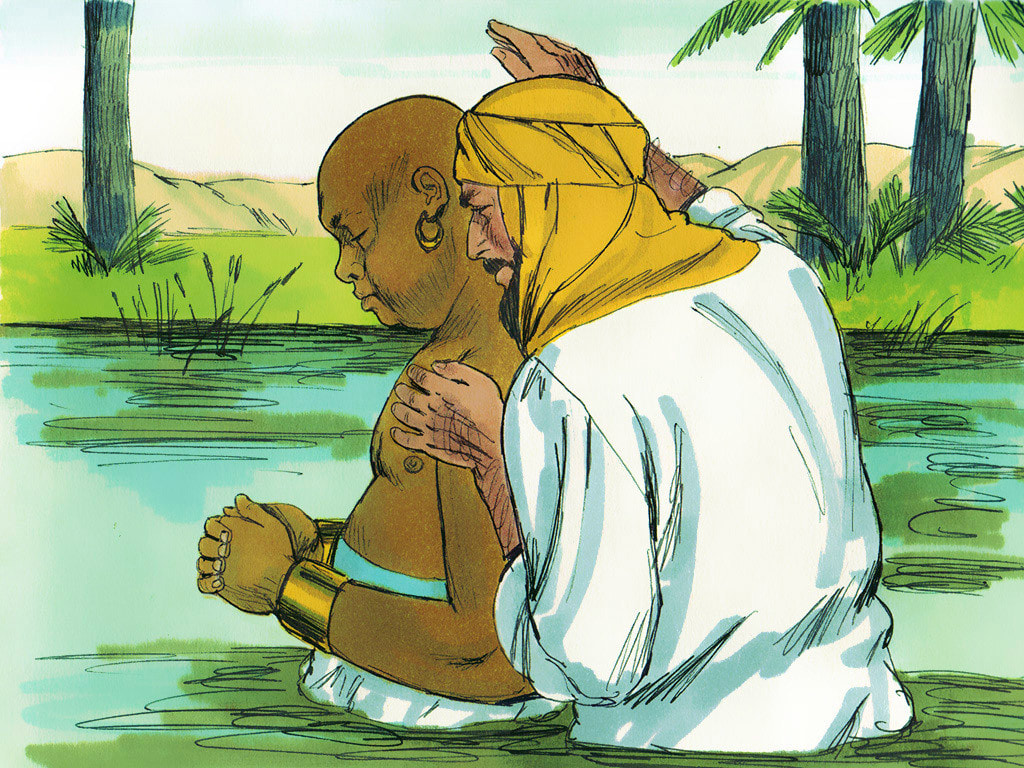
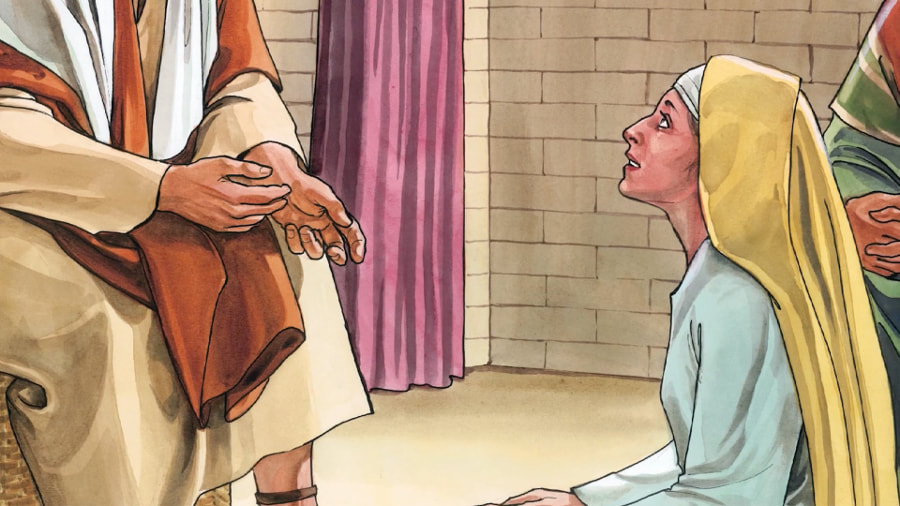

 RSS Feed
RSS Feed
